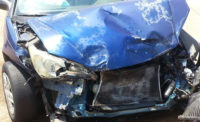Since 2016, General Motors has fought orders to replace allegedly defective Takata airbags in over six million of its pickup trucks and SUVs, arguing in a series of petitions that the recall is unnecessary because the airbags are safe. Four years after receiving the first of the petitions, the National Highway Traffic Safety Administration (NHTSA) has yet to rule on them, leaving owners of the vehicles in limbo.
“Every time I have a passenger in the front seat I feel they and I are in danger,” wrote one anonymous owner in a comment posted on a federal website. “This situation is a nightmare.”
“If my airbag explodes and injures or kills someone, who is to blame?” wrote James Smylie in December 2019.
The situation highlights what critics claim is foot-dragging by NHTSA and the auto industry in completing the largest auto recall in U.S. history. NHTSA did not respond to multiple requests for comment.
The recalls involve tens of millions of airbags made by Takata, the Japanese parts supplier, mostly between 2002 and 2015. Each airbag contained an ammonium nitrate-based propellant that in rare cases could rupture explosively, spraying drivers and passengers with metal shrapnel. To date, at least 25 deaths and hundreds of injuries worldwide have been linked to Takata airbags.
Kevin Fitzgerald, a former Takata engineer and whistleblower, said that General Motors lags far behind all other manufacturers in light of the millions of vehicles that the company refuses to recall. “What they’re doing is unbelievable,” Fitzgerald said. “The inflators in those SUVs are absolutely no different than the tens of millions being recalled by 19 other manufacturers.”
GM spokesman Daniel Flores told FairWarning the company is “confident that the inflators in the [GM] vehicles do not present an unreasonable risk to safety, continue to perform as designed in the field and will continue to perform as designed in line with the results of our accelerated aging studies.”
Flores added that none of the GM vehicles covered by the petitions have had inflator ruptures in the field or in lab tests.
Safety advocates say NHTSA must act promptly on the GM petitions because, with changes in ownership and addresses, it becomes harder over time to find affected owners and vehicles.
In 2015, Takata signed a consent order with NHTSA agreeing to federal oversight as it phased out millions of defective airbags, and to pay civil penalties of $200 million. NHTSA also set a schedule for automakers to replace the airbags. Since then, roughly 63 million Takata airbags have been recalled in the U.S. by 19 automakers, according to NHTSA.
To streamline the enormous task, NHTSA lumped affected vehicles into 12 categories based on the degree of risk of an explosive malfunction. Vehicles with older airbags in hot, humid areas, where inflators are more likely to degrade were given the highest priority for replacement. Newer airbags in colder areas had a lower priority.
NHTSA had ordered automakers to complete all repairs for the three highest-risk groups by December 2017, and to finish repairs for the fourth highest group by December 2019. But the agency then granted numerous extensions for various reasons, such as lack of availability of replacement parts, and no automaker has met the original schedule.
As of May, over 6 million airbags in the top four groups are still unrepaired, according to NHTSA’s website. Altogether, according to agency figures, there are over 12.4 million airbags that have not been replaced—not counting the airbags that are the subject of the GM petitions.
“We’re past the point, to be blunt, of asking why the manufacturers aren’t [doing more to repair vehicles], and now we’re at the point of asking why NHTSA isn’t forcing them to,” said Jason Levine, executive director of the Center for Auto Safety. “It’s only by sheer luck that we haven’t seen more fatalities.”
As of January, 11 automakers had completed at least 70 percent of total repairs, according to a recent report by an independent monitor overseeing the recall. But several manufacturers are short of that mark. Mitsubishi has completed about 57 percent of its repairs; completion rates for Chrysler and Mazda are about 63 percent and 67 percent, respectively.
Bringing up the rear is Mercedes-Benz, considered a champion of safety, with an airbag replacement rate of just over 42 percent.
Mercedes-Benz spokesman Benjamin Zhang said in an email that completion rates alone do not paint a full picture of the company’s efforts, which he said they have been affected by availability of parts and the fact that the company is replacing entire airbag modules, not just inflators. Zhang added that the company is not aware of any injuries involving Takata airbags in Mercedes’ cars.
The independent monitor noted in a recent report that traditional letter campaigns asking owners to bring in their vehicles generate a low level of response.
Some manufacturers put more muscle in their efforts by using license plate reading technology to determine which vehicles are still on the road. One manufacturer, not identified in the monitor’s report, even used cash incentives to convince customers to get their repairs.
Mobile repair campaigns—sending technicians to do fixes in owners’ driveways—are much more effective than other strategies, but have been rarely used in the airbag repairs.
“We’re hoping to see one of the long-term outcomes of the Takata recall be a new playbook to deal with recalls,” said Jason Levine of the Center for Auto Safety.
Last month NHTSA gave automakers the good news that they would not need to recall an additional 56 million Takata airbags, based on safety reports by Takata and a consortium of automakers. Unlike those covered by the recalls, these airbags used a chemical drying agent that reduces the risk of the inflator degrading. Affirming the conclusions of the Takata study, NHTSA found that the airbag inflators did not pose a risk. With the exception of some older Volkswagen models, no recall would be necessary.
The Center for Auto Safety and other consumer groups condemned NHTSA for accepting an industry-written report that some argued was flawed. But for longtime observers of the Takata recall, the decision didn’t come as a surprise.
“The automakers do what they please while the agency turns a blind eye,” wrote Kevin Fitzgerald in a LinkedIn post. “Somewhere along the way, NHTSA forgot who they were supposed to be fighting for.”
About FairWarning
This story was reported by FairWarning (www.fairwarning.org), a nonprofit news organization based in Pasadena, Calif., that focuses on public health, safety and environmental issues.
Did you like this story? Your support means a lot! Your tax-deductible donation in any amount will advance our mission of delivering strong watchdog reporting.







.jpg?t=1721257160)

